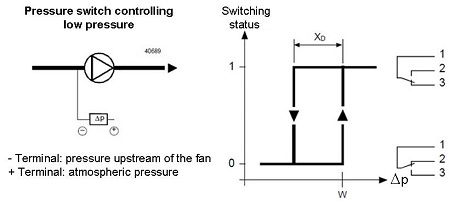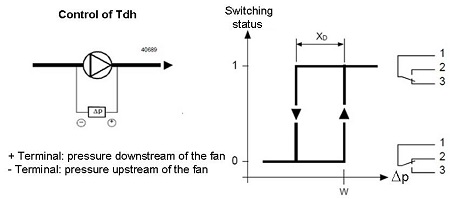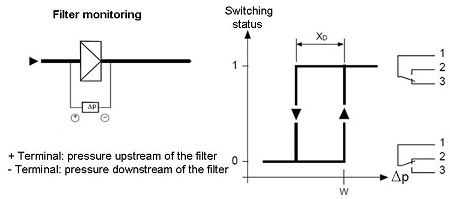For
training at PB level, this section and the others will not be
studied.
When
connecting flexible tubes the following principle should be
respected:
- The “ + ” terminal of the pressure switch should be connected to the highest pressure side
- The “ – “ terminal to the lowest pressure side.
An
important point to note is that pressure switches are designed in
technological terms such that the contact is activated by an increase
of pressure, so it measures the value of excess pressure (+)
terminal in relation to the pressure measured at the (–)
terminal.
The
diagram below shows that the W setting is a positive number.
- When the pressure difference between the (+) terminal and the (–) terminal of the pressure switch increases and reaches the (W) setting, the circuit 1-3 closes.
- When the pressure difference between the (+) terminal and the (–) terminal of the pressure switch falls to the value (W – Xp), the circuit 1-3 opens and the circuit 1-2 closes.

Source siemens, pressure switch QBM 81
Depending
on the scale of control (negative pressure, excess pressure, Tdh,
head loss) we can use the contacts 1-2 or 1-3 to activate an action
and/or an alarm (see
the following exercises).
Question
Justify the connecting of the flexible tubes of the pressure switch shown below.
Which contact would you use (1-2 or 1-3) to activate the defect alarm.

The ( – ) negative terminal of the pressure switch should be connected to the lowest pressure side.
The suction of the fan is in negative mode (compared to the atmospheric pressure). The flexible tubes are correctly connected. When the pressure difference between the (+) terminal and the (-) terminal falls to the value W – Xp, the contact of the circuit 1-3 opens and that of 1-2 closes. This is what would happen if the vacuum to suction pressure levels are abnormally low (a sign of a broken drive belt).
Question
Justify the connecting of the flexible tubes of the pressure switch shown below.
Which contact would you use (1-2 or 1-3) to activate the defect alarm.

The (– ) terminal of the pressure switch must be connected to the lowest pressure side.
The ( + ) terminal must be connected to the highest pressure side.
The suction of the fan is in negative mode (compared to the atmospheric pressure).
The discharge of the fan is on overpressure (compared to the atmospheric pressure).
The flexible tubes of the pressure switch are correctly connected. When the pressure difference between the (+) terminal and the (-) terminal falls to the value (W – Xp), the contact of the circuit 1-3 opens and that of 1-2 closes. This is what would happen if the Tdh of the fan is abnormally low (a sign of a broken drive belt).
We could therefore use the contact 1-2 to set off an alarm and stop the fan (after a time delay).
Question
Justify the connecting of the flexible tubes of the pressure switch shown below.
Which contact would you use (1-2 or 1-3) to activate the defect alarm.

The ( – ) terminal of the pressure switch must be connected to the lowest pressure side
The ( + ) terminal must be connected to the highest pressure side.
The upstream pressure of the filter is higher than the downstream pressure (due to the head loss of the filter)
The flexible tubes of the pressure switch are correctly connected. When the pressure difference between the (+) terminal and the (-) terminal increases and reaches the setting (W), the contact of the circuit 1-3 closes. This is what would happen if the head loss of the filter rises abnormally (a sign of its clogging).
We could therefore use the contact 1-3 to set off an alarm and stop the fan (after a time delay).
